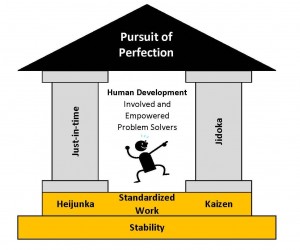One of the two pillars of the Lean house is Jidoka, and that is the focus of this post. Jidoka is one of the core principles of Lean and within the Toyota Production System it focused on the relationship between “man and machine.” Jidoka is used to empower employees (man) to stop a process whenever a problem is detected. When practiced at Toyota, this actually meant employees would stop the assembly line (machine) if there was a quality problem with the product. They might have pulled a lever or pressed a button to do so. When stopped, employees would gather to address and respond to the problem immediately before the line could begin again.
Jidoka is typically described as a “respect for people,” as it is used to encourage staff to report and respond to problems. When addressing a problem it improves communication among the process stakeholders, with an outcome of decreasing errors and defects. The urgency and emphasis it puts on responding to problems gradually shifts the culture of an organization. It shifts the focus from passing on errorsto immediately responding to them without assigning blame. Without the fear of blame and focusing on the problem, trust builds and employees are even further empowered.
To be more inclusive to our University environment, I I like to think of Jidoka as a relationship between “man and process.” Not all process and parts of processes include phisical product or machines. I encourage you to think about what errors you encounter each day within your processes and think about how you could incorporate a stop and respond approach to ensure the same problem did not occur again.
